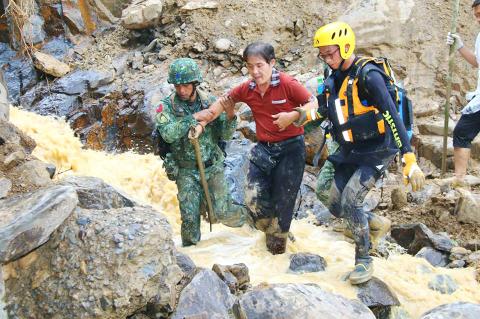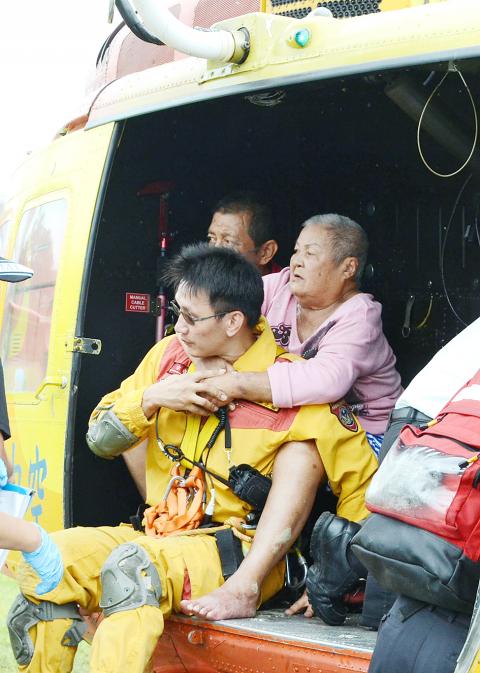The nation yesterday struggled to recover from the devastation caused by Typhoon Soudelor, with about 240,000 households nationwide still left without electricity as of press time last night.
The Central Weather Bureau lifted both sea and land warnings for Typhoon Soudelor at 8:30am yesterday after it moved toward China’s Fujian Province. Statistics from the Ministry of the Interior showed that the strongest typhoon the nation has faced this year killed seven people and left five missing.
The number of people injured during the typhoon had risen to 402.

Photo: CNA
Taiwan Power Co (Taipower, 台電) said in a written statement said that work to restore power was restricted because either road access to disaster-stricken zones was cut off or power facilities were covered by fallen trees, adding that it had to wait for highway authorities and local governments to remove obstacles so that work could begin.
Taipower said that about 4.3 million households had experienced power failure on Saturday because of the typhoon, the highest number that the company had ever handled, adding that the number had dwindled to 236,980 by 7:16pm.
The National Airborne Service Corps was dispatched to airlift 13 people from the mountainous area in New Taipei City’s Wulai District (烏來) to receive medical treatment as the area remained cut off from the rest of the city because of severely damaged roads. Helicopters were also sent to deliver 700kg of food and other life-sustaining items to residents in the area. A photograph taken from an airborne helicopter showed that the river in Wulai had burst its banks.

Photo: CNA
Hot-spring pipelines on both sides of the river were destroyed by the flood.
The Directorate-General of Highways said that the section between Kueishan Bridge (龜山橋) and Wulai on the Highway No. 9 — the only way to reach Old Street in Wulai — suffered serious erosion of the roadbed, adding that reconstruction work can only be completed using heavy machinery. It estimated that Wulai would not be accessible to the general public until Sunday.
To assist the New Taipei City Government in rescuing people still trapped in Wulai, the Ministry of National Defense sent 36 members of the Army Special Combat Forces and four Hummers.
While the rest of the nation managed to weather the storm, clean water supply also became an issue.
Many supermarkets were sold out of bottled water as people finding tap water too turbid to use searched for cleaner alternatives.
The Taipei Water Department said that the turbidity of the water from the Sindian River (新店溪), which is a source of tap water, had at one point escalated to 30,000 nephelometric turbidity units (NTU), or five times more than the maximum capacity of the water treatment facility.
Though the turbidity had dropped to 4,500 NTUs, people are advised to boil water before drinking it, the department said.
Taiwan Taoyuan International Airport has had to deal with a huge backlog of flight passengers, as 366 flights were canceled on Saturday due to the arrival of the typhoon.
It said that 120,000 passengers were at the airport yesterday, which is equivalent to the volume that the airport saw during the Lunar New Year holiday. In addition, agricultural damage caused by Typhoon Soudelor was estimated at NT$600 million (US$18.9 million).
The government received a total of 23,953 disaster reports from the public. A total of 6,470 cases were related to fallen trees, which was the highest among all the other disaster categories.

MAKING WAVES: China’s maritime militia could become a nontraditional threat in war, clogging up shipping lanes to prevent US or Japanese intervention, a report said About 1,900 Chinese ships flying flags of convenience and fishing vessels that participated in China’s military exercises around Taiwan last month and in January last year have been listed for monitoring, Coast Guard Administration (CGA) Deputy Director-General Hsieh Ching-chin (謝慶欽) said yesterday. Following amendments to the Commercial Port Act (商港法) and the Law of Ships (船舶法) last month, the CGA can designate possible berthing areas or deny ports of call for vessels suspected of loitering around areas where undersea cables can be accessed, Oceans Affairs Council Minister Kuan Bi-ling (管碧玲) said. The list of suspected ships, originally 300, had risen to about

DAREDEVIL: Honnold said it had always been a dream of his to climb Taipei 101, while a Netflix producer said the skyscraper was ‘a real icon of this country’ US climber Alex Honnold yesterday took on Taiwan’s tallest building, becoming the first person to scale Taipei 101 without a rope, harness or safety net. Hundreds of spectators gathered at the base of the 101-story skyscraper to watch Honnold, 40, embark on his daredevil feat, which was also broadcast live on Netflix. Dressed in a red T-shirt and yellow custom-made climbing shoes, Honnold swiftly moved up the southeast face of the glass and steel building. At one point, he stepped onto a platform midway up to wave down at fans and onlookers who were taking photos. People watching from inside

Japan’s strategic alliance with the US would collapse if Tokyo were to turn away from a conflict in Taiwan, Japanese Prime Minister Sanae Takaichi said yesterday, but distanced herself from previous comments that suggested a possible military response in such an event. Takaichi expressed her latest views on a nationally broadcast TV program late on Monday, where an opposition party leader criticized her for igniting tensions with China with the earlier remarks. Ties between Japan and China have sunk to the worst level in years after Takaichi said in November that a hypothetical Chinese attack on Taiwan could bring about a Japanese

STREAMLINED: The dedicated funding would allow the US to transfer equipment to Taiwan when needed and order upgraded replacements for stockpiles, a source said The US House of Representatives on Thursday passed a defense appropriations bill totaling US$838.7 billion, of which US$1 billion is to be allocated to reinforcing security cooperation with Taiwan and US$150 million to replace defense articles provided to the nation. These are part of the Consolidated Appropriation Act, which the US House yesterday passed with 341 votes in favor and 88 against. The act must be passed by the US Senate before Friday next week to avoid another government shutdown. The US House Committee on Appropriations on Monday unveiled the act, saying that it allocates US$1 billion for the Taiwan Security Cooperation Initiative